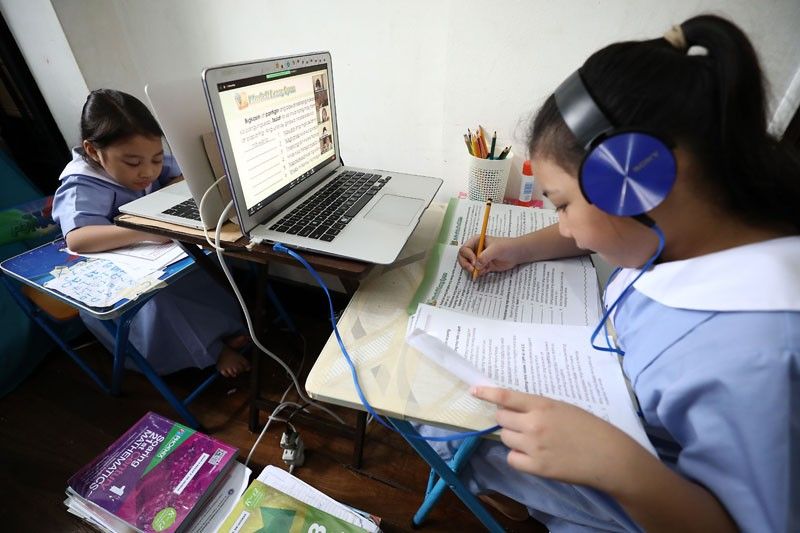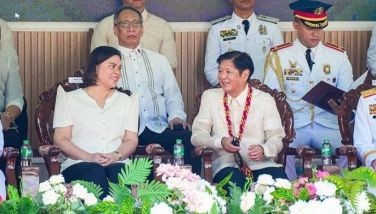Group forms E-Skwela Hubs

MANILA, Philippines — A socio-civic organization has established nine “E-Skwela Hubs” so far in some parts of the country to complement the Department of Education (DepEd)’s blended learning, especially since it may not yet be fully equipped to carry out its mandate.
Rep. Ronnie Ong of party-list Ang Probinsiyano said their project, in partnership with Frontrow Philippines, will help address the shortage of gadgets and the lack of internet access necessary to implement DepEd’s online learning.
“With the help of Frontrow Philippines, we are hoping to put up at least 16 more of these E-Skwela Hubs just to help bridge the gap of this obvious shortage in gadgets and the lack of internet access,” he said.
Out of the targeted 25 E-Skwela Hubs, Ong said that they have already established nine centers – Baguio, Manila, Pasig, Danao and Tuburan in Cebu province, as well as the four municipalities of Poro, Pilar, Tudela and San Francisco in the Camotes Islands.
The establishment of these E-Skwela Hubs can be used by students and teachers who still have no equipment and internet access for DepEd’s “blended” classes.
According to Ong, these are all equipped with internet, computers and printers which can be used to produce learning modules.
Additional hubs are also being readied in Tondo and Sampaloc in Manila, in Valezuela City, La Union, Cagayan Valley, Ilocos Norte, Pampanga, Batangas, Bacolod, Bohol, Eastern Samar, Ormoc, General Santos City, Surigao, Zambonga and Siargao.
Ong said the DepEd could duplicate the E-Skwela program by creating similar partnerships with the private sector and local government units for the establishment of more E-Learning centers, especially in far-flung barangays.
He said the country needs at least one E-learning center for every barangay if DepEd truly desires to provide quality education for all.
“We have been hoping that the DepEd would just declare this school year as a gap year since there is really no way that it could fully carry out this so-called blended learning, considering the economic condition of many Filipinos especially now that we are in the middle of the coronavirus pandemic,” Ong said.
“Since it was DepEd that was insistent that we resume classes despite the pandemic, its officials should use a bit of their imagination so that our students and teachers can have free access to computers and the internet,” he added.
More teachers needed
Sen. Francis Pangilinan called on DepEd to intensify the hiring of teachers to ensure that positions funded by the current 2020 budget and its upcoming 2021 appropriations are filled.
“The best way to honor our teachers and non-teaching school personnel is to guarantee that they have jobs and that their welfare is protected,” Pangilinan said as he saluted Filipino educators on Teachers’ Month.
Due to the COVID-19 pandemic, the DepEd has reported that 748 out of 14,435 private schools nationwide would not be operating for the upcoming school year.
This would affect some 3,233 teachers and 40,345 learners, who were either forced to transfer to public schools or drop out of school. According to the DepEd, there are 988,567 positions of which only 932,760 are filled, and 55,807 are unfilled.
Aside from these, DepEd said it has requested for additional 10,000 posts under the proposed 2021 budget.
The senator also pushed for additional budget for the needs of teachers and non-teaching personnel so they could effectively carry out their task in both online and modular learning.
The August 2020 DepEd Learner Enrollment Survey indicated that more than 50 percent of learners prefer the use of printed modules in the conduct of distance education in the upcoming school year.
Sen. Grace Poe said the DepEd should immediately forge “crucial partnerships” with telcos and the private sector to enable indigent learners to equally benefit from online learning.
“Our poor students across the country should be given the opportunity as well to participate in online classes instead of merely being confined to printed modules. They must not be daunted or impeded by sheer lack of basic access,” Poe said.
“We owe it to them to consolidate the needed assistance for optimal learning to harness our children’s best potentials,” she said.
At the Sept. 25 hearing of the Senate on DepEd’s budget next year, Poe asked Secretary Leonor Briones if her department has forged a number of memorandums of agreement (MOA) with telcos to help both students and teachers pursue effective and meaningful online education.
Briones confirmed the existence of such MOAs with private providers whose pursuits are “harmonious” with their programs. At the same time, the secretary noted that the “cost aspect” was an important consideration.
“The challenge for us (in the department) is to reduce our dependency on printed materials and move in the direction of tapping online tools for education,” the secretary said.
“No child must be left behind,” the senator said, noting the importance of a whole-of-society approach in enabling less fortunate children to have equal opportunities.
Poe earlier donated mobile gadgets to poor students through their schools to help them cope with the shift to online and blended learning amid the pandemic.
‘Pandemic pods’
Sen. Sherwin Gatchalian said as the DepEd plans to hire “learner support aides” in the roll-out of distance learning, he said they should only be deployed in low-risk areas and that rigorous health standards should be observed to prevent an uptick in COVID-19 cases.
Gatchalian likened the idea of learner support aides to learning pods, which are sometimes called pandemic pods, nano-schools or micro-schools. These are small gatherings of between three to 10 children for face-to-face instruction and social interaction.
These pods have become popular in the US as some parents with small children said they were worried their kids would not have the attention spans needed for online learning. Some pods are hiring teachers to teach children’s curriculum, others share responsibilities with parents.
DepEd Undersecretary Jesus Mateo said the department is finalizing guidelines on the hiring of learner support aides, which include tutors and para-teachers.
Gatchalian, chairman of the Senate committee on basic education, said learner support aides will help parents who cannot assist their children in home-based learning.
“We can deploy learner support aides immediately to low risk areas. We just need to make sure that they will pass rigorous health tests or health standards. They should observe social distancing and wearing of masks. Inviting anyone to our homes can increase the risk of infection,” he said.
Meanwhile, Social Welfare Secretary Rolando Joselito Bautista urged parents to be mindful of their children’s activities online especially with their increased time on the internet during the ongoing community quarantine.
Bautista issued the call as he urged Filipino families to join the celebration of the just concluded 28th National Family Week (NFW) from Sept. 21 to 27 last week.
The NFW is a yearly celebration held every fourth week of the September pursuant to Presidential Proclamation No. 60 issued on Sept. 28, 1992. – Paolo Romero, RainierAllan Ronda
- Latest
- Trending






























